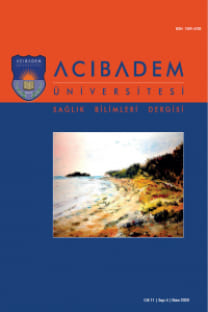Ebelik Öğrencilerinin Anne Sütü ve Emzirme Mitleri Hakkındaki Görüşleri
Midwifery Students's Opinions About Human Milk and Breastfeeding Myths
___
1. Öztek Z, Kubilay G. Toplum Sağlığı Hemşireliği, Ankara, Somgür Yayıncılık. 1997.2. Quinn A, Haller S. Breastfeeding Incidence After Early Discharge Factors Influencing Breastfeeding Cessation. Journal Obstetric and Gynecologic Neonatal Nursing 1997;26,289-94.
3. Well Fed: Moving Breastfeeding from Personal Choice to Public Health Issue By Fia,Curley.(Erişimtarihi:15.04.2015).http://minorityhealth. hhs.gov/templates/content.aspx?ID=9467&lvl=3&lvlID=326.
4. Department of Health and Human Services (US).(2011). The Surgeon General’s call to action to support breastfeeding. Washington: HHS, Offi ce of the Surgeon General;(Erişimtarihi:08.04.2015). http://www.surgeongeneral.gov/topics/breastfeeding/ calltoactiontosupportbreastfeeding.pdf [cited 2011 Jun 26].
5. Healthy People 2020: Breastfeeding Objectives (2013). (Erişim tarihi: 15.04.2015) www.usbreastfeeding.org/.../HealthyPeople2020.
6. Türkiye Nüfus ve Sağlık Araştırması (TNSA). (2003) (Erişim tarihi:15.04.2015). http://www.hips.hacettepe.edu.tr/tnsa2003/data/ ozetrapor.pdf.
7. Türkiye Nüfus ve Sağlık Araştırması (TNSA). (2008). (Erişim tarihi:15.04.2015). http://www.hips.hacettepe.edu.tr/TNSA2008- AnaRapor.pdf In;.
8. Türkiye Beslenme ve Sağlık Araştırması (TBSA). (2010). T.C. Sağlık Bakanlığı Yayın No: 931, Sağlık Araştırmaları Genel Müdürlüğü Yayın No: SB-SAG-2014/02.
9. Türkiye Nüfus ve Sağlık Araştırması (TNSA).2013. (Erişim tarihi:01.06.2015). http://www.hips.hacettepe.edu.tr/TNSA2013_ sonuclar_sunum_2122014.pdf.
10. WHO/UNICEF. Global Strategy for Infant and Young Child Feeding. Geneva, Switzerland. 2003.
11. American Public Health Association. American Public Health Association Policy Statement, 81-26. Nestle Boycott. Washington. 2007.
12. Public Health Report. How to Achieve Long-term Breast-feeding: Factors Associated with Early Discontinuation 2011;11,1173-79.
13. UNICEF UK. Preventing disease and saving resources: the potential contribution of increasing breastfeeding rates in the UK. 2012.
14. WHO. (2010). Breastfeeding key to saving children’s lives. (Erişim tarihi: 15.04.2015). www.who.int/.../2010/breastfeeding_2010073.
15. UNICEF. A Report on Nutrition. 2012. 16. McLachlan H, Forster DA. Initial breastfeeding attitudes and practices of women born in Turkey, Vietnam and Australia after giving birth in Australia. Int Breastfeed J 2006; 1, 7.
17. WHO. (2011). World Health Statistics 2011. (Erişim: 15.04.2015). ttp://www.who.int/gho/publications/world_health_statistics/EN_ WHS2011_Full.pdf.
18. Yurtsal ZB. Gebelere ve Eşlerine Verilen Emzirme Eğitimi ve Danışmanlığının Emzirme Sürecine ve Bağlanmaya Etkisi, Danışman: Prof.Dr. Gülay KOÇOĞLU, Halk Sağlığı ABD, Doktora Tezi,Sivas. 2014.
19. Lawrence RA, Lawrence RM. Breastfeeding. A Guide For The Medical Profession.Mosby.Elsevier.7th edition. 2011.
20. Lauwers J, Swisher A. Counseling The Nursing Mother: A Lactation Consultant’s Guide. Fifth Edition. Jones&Bartlett Learning, LLC. 2011.
21. Sears M, Sears W. The Breastfeeding Book. Evetything You Need to Know About Nursing Your Child From Birth Through Weaning.Little, and Company Hachette Book Group, New York. 2000.
22. Eryılmaz G. Laktasyon ve Emzirme. Kadın Sağlığı. 2008.
23. Newman J. Some Breastfeeding Myths. 2014.
24. Little RE, Anderson KW, Ervin CH, Worthington-Roberts B, Clarren SK. Maternal alcohol use during breast-feeding and infant mental and motor development at one year. N Engl J Med. 1989;321:425–30.
25. Mennella JA, Pepino MY. Breastfeeding and prolactin levels in lactating women with a family history of alcoholism. Pediatrics. 2010;125(5). www.pediatrics.org/cgi/content/full/125/5/e1162.
26. Subcommittee on Nutrition During Lactation, Institute of Medicine, National Academy of Sciences. Nutrition During Lactation. Washington, DC: National Academies Press; 1991:113–52.
27. Koren G. Drinking alcohol while breastfeeding. Will it harm my baby? Can Fam Physician. 2002;48:39–41.
28. A Division Of St John Of God Health Care Inc. Breastfeeding guidelines. St John of God Hospital Geelong. (erişim: 09.07.2015) http://www.sjog. org.au/pdf/SJG%20GEELONG%20BREASTFEEDING%20GUIDE.pdf.
29. Breastfeeding After Breast Surgery. Australian Breastfeeding Association - 2012 - Breastfeeding.Asn.Au(Erişim:09.05.2015). https://Www.Breastfeeding.Asn.Au/Node/20012.
- ISSN: 1309-470X
- Yayın Aralığı: 4
- Başlangıç: 2010
- Yayıncı: ACIBADEM MEHMET ALİ AYDINLAR ÜNİVERSİTESİ
Yönetimde Yeni Yaklaşımlar: Örgütsel Vatandaşlık Davranışı
Ebelik Öğrencilerinin Anne Sütü ve Emzirme Mitleri Hakkındaki Görüşleri
Zeliha Burcu YURTSAL, Sultan UÇUK, Özlem Duran AKSOY, Berrin TALİ, Sultan TEMEL
Mustafa Bilge ERDOĞAN, Özlem DEMİRPENÇE, Mustafa YILDIRIM
ENTÜBASYON SONRASI MEYDANA GELEN TEK TARAFLI HİPOGLOSSUS FELCİ
M. Güven GÜVENÇ, A. Sanem ÖZATA, Türker ŞENGÜL, Sibel ŞENER
Mustafa ÜNAL, Duygu Yazgan AKSOY, Serdar GÜLER
ÇOCUKLARDAKİ CROHN HASTALIĞINDA ERKEN CERRAHİ TEDAVİ YARARLI MI YOKSA ZARALI MI?
Madde Bağımlısı Hastalarda Sosyal Destek ve Benlik Saygısı
Gülçin AVŞAR, Filiz KOÇ, Gülay ASLAN
Hemşirelik Bölümü Birinci Sınıf Öğrencilerinin Meslek Seçimini Etkileyen Faktörler
Funda Kardaş ÖZDEMİR, Zümrüt Akgün ŞAHİN
KLOMİFEN SİTRAT TEDAVİ BAŞLANGIÇ GÜNÜNÜN ENDOMETRİUM VE SERVİKAL MUKUSA ETKİSİ
Berna SEÇKİN, Hulusi Bülent ZEYNELOĞLU, Sertaç BATIOĞLU, Oya GÖKMEN
